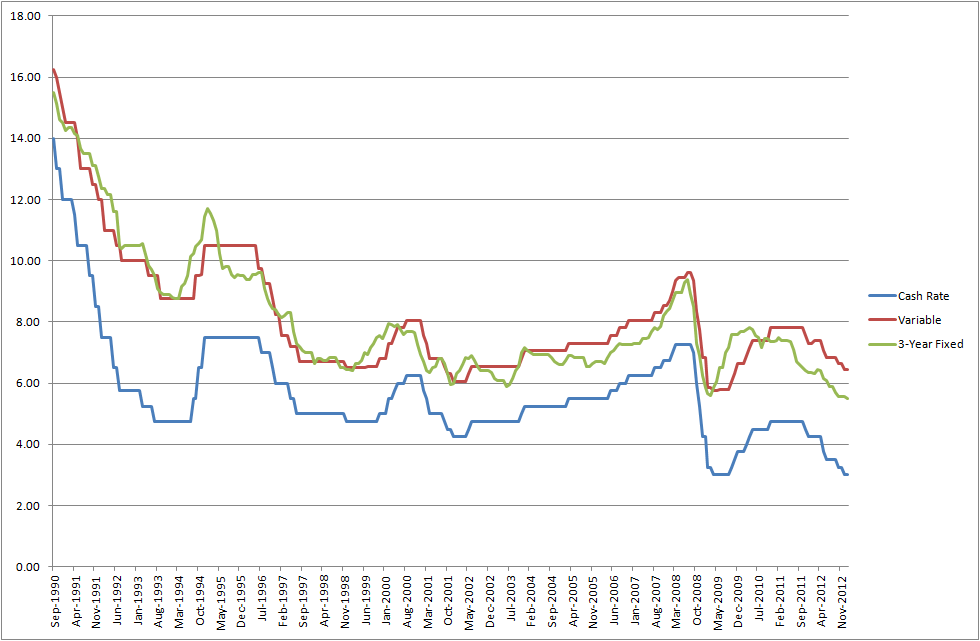
The Dangers Of Cross Collateralisation
If/when you get to a point in your life where you own multiple properties, you will no doubt come across the term ‘cross collateralisation’. It’s a very important loan structure issue that you must fully understand if you ever do decide that it’s the best option for you. Many mortgage brokers (my first included) don’t actually understand the full implications themselves and are more than happy to sign you up for it because it’s usually an easier process. Cross collateralisation can very rarely be a good option, the majority of the time it simply increases the investors risk and strengthens the banks position of power.
Cross Collateralisation Explained
Cross collateralisation is when you use house A as security for purchasing house B.
Lets look at how you buy a house in the first place. THE most important thing when buying is….THE DEPOSIT! Banks love that shit. If the deposit is big enough you can pretty much guarantee that the bank will approve your loan.
No Job? No Education? No prospects?
Got a huge deposit, no worries. (I’m talking like >70% here guys)
It’s important to understand what the actual deposit means to the banks. It’s their way of lowering their exposure to risk.
Think about this. If you buy a $400K house with a 20% deposit that means the banks lent you $320K. Worst case scenario for the banks is you default on your loan and they are forced to sell to recoup their investment (the loan). They are not worried in the slightest about making money from this property, they just want their money back asap.
Ever wonder why you always hear of these stories of foreclosure bargains? It’s because the banks could not give two shits about an extra $10K, $20K or $40K. That’s pocket change to them. They just want to get back what’s theirs.
So now they have this house which the owner paid $400K for. Unless there has been a big downward swing in the market you would surely think that the banks could at the very least sell it for somewhere near the $320K mark. If they do then relatively no harm done, they loaned out $320K and got back their investment. No money made but minimal lost…except if you’re the poor sod that applied for the loan. You’re probably down the shitter now but like the banks care right?

So as you can see, the deposit is king to the banks and without a decent sized one (at least 20%) you are likely to pay exuberant fees to get the loan approved.
So why have I explained the above? Well as I have already mention, deposit is king. But what if I told you there was a way to get a loan approved without having to fork out one dollar? With the flick of a pen you can have access to hundreds of thousands of dollars.
Sounds too good to be true.
Enter Cross Collateralisation.
No Such Thing As A Free Lunch
Cross Collateralisation uses equity as the ‘down payment’ instead of cold hard cash. To simplify things, lets assume we have $200K of untapped equity on our family home (House A). We want to buy House B for $400K but don’t have a deposit.
To secure the loan we can use the equity from House A as collateral. This essentially does the same job of lowering the banks risks, just utilizing a different method.
House A Loan: $300K
House A Value: $500K
House B Loan: $420K (loan includes 5% buying costs)
House B Value: $400K
Security: $500K + $400K (the value of both properties)
LVR : $300K + $400K = $700K
. $500K + $400K = $900K
= 77% LVR (loan value ratio)
There will be a section in the loan contract that details that this loan is secure using another property over which the lender holds it’s mortgage.
‘Wow that’s pretty cool isn’t it? Didn’t even have to save any money to buy another property and the banks made the loan contract a breeze. I’m going to buy all my properties from now on using this method’
You must consider the ramifications first.
1. Selling Headaches
Every wonder what happens when you want to sell the property that you used to secured the others?
To put it simply…Whatever the bank decides is going to happen.
They have complete control over the proceeds of the sale. I hope you didn’t have anything planned for the money you were going to get when you sell House A. Because the bank has just decided that House B is at a higher risk than when you first bought it and now requires your loan to be at 70% LVR. So that $200K you just received is going straight to the loan on House B…Nothing you can do about it.
And if you think that’s bad. Imagine a situation where you have secured multiple houses with multiple other houses…shit show.
2. Equity Withdrawals
At the moment, if I want to withdraw equity from one of my properties it’s super simple. I apply for the withdrawal and as long as I’m keeping it under 80% LVR there are minimal hoops I have to jump through. I’ve done this three times now (once for each of my IPs) and it’s been very straight forward.
There has been times though where one of my properties have gone up in value and the others have gone down. Because my properties are not cross collateralised I am able to access the equity from the IP that went up because they are seen by the banks as separate .
If you have all your properties cross collateralised however the bank views all of them as the same. You might have had one IP go up by $50K but the others go down by $30K each. This would mean you can’t access the equity on the one that went up which may impact your opportunities moving forward.
3. Want To Swap Lenders?
‘Hey look at that! CBA has been ripping me off with their high interest rate. I’m going to move all my loans to the lower rate at Ubank’
People do this all the time. The problem with Cross Collateralisation is that you can’t just move one or two loans across. You have to either move everything or nothing. Depending on who you’re going to they may not want that level of risk exposure. They might charge extra fees for having to value all the properties to determine the position.
In short it’s a pain in the ass for a process that is so much easier for stand alone loans.
4. Complicates Things
The extra paper work you have to complete only increases the more you cross collateralise.
Want to sell? Complete evaluation of your entire portfolio (assuming you have cross collateralised your entire portfolio).
Want to withdraw equity? Complete review of your financial position on all properties.
Want to move banks?…. You get the picture.
What To Do?
If you discover cross collateralisation exists in your portfolio without you even knowing it (happens all the time) there are a few things to consider.
Cross collateralisation isn’t a problem… until is it.
What I mean by that is that it’s perfectly fine to cross collateralise if nothing goes wrong. But the odds of something undesirable happening increase when you cross collateralise and it usually only benefits the bank.
If you want to uncross your loans go see a mortgage broker who can assist you and work out a plan of attack.
Stand Alone Loans
You really want all your loans stand alone. The only advantage I really see for cross collateralisation is the convenience of setting them up. The banks really like to strengthen their position so they make it super easy to cross collateralise.
The thing is, if you have equity. You can withdraw the equity as cash and use that cash as a down payment for a new loan. I have utilized this method in the past and have had great success with it.
You have to check with your lender on the conditions for equity withdrawal but if you can do it, it’s a much smarter way to buy your next investment as opposed to using cross collateralisation.
Wrapping Up
Cross collateralisation may be convenient and appealing for investors looking to buy a new property without using their own money. However, cross collateralisation rarely is a good thing and the majority of the time it does nothing but cause headaches later down the track. The banks prefer cross collateralisation because it strengthens their position of power and they have all the control.
If you have equity available, look to withdraw this equity as cash to use as the down payment for the new loan. You might have some short term pain with a bit more paperwork and a few more hoops to jump through but your future self will thank you for laying the foundations of a strong portfolio now rather than later.









